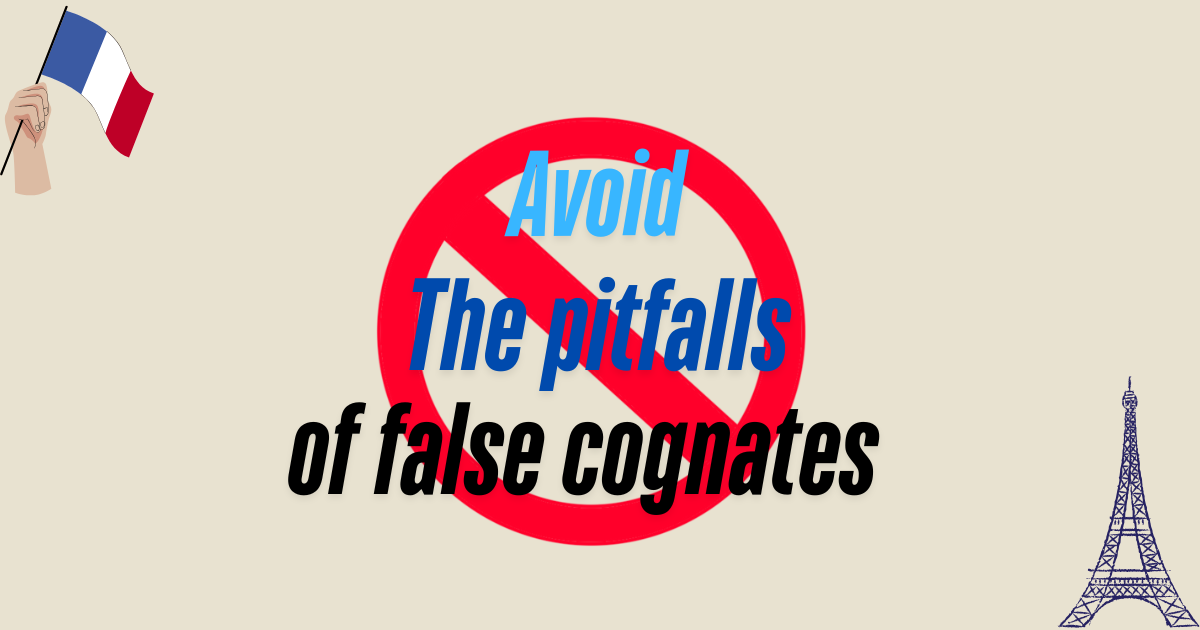Navigating French Like a Pro: Avoiding the Pitfalls of False Cognates
Introduction
Learning French can be an exciting journey, but it’s not without its challenges. One common hurdle that trips up even the most diligent learners is the world of false cognates—those sneaky words that look similar in English and French but have entirely different meanings. These “false friends” can easily lead to confusion, misunderstandings, and even some embarrassing moments! In this post, we’ll dive into some of the most frequent false cognates, giving you the tools to sidestep these common mistakes and enhance your French language skills.
Section 1: What Are False Cognates?
Definition: False cognates, also known as false friends, are words in two languages that appear similar due to their spelling or pronunciation but have different meanings.
Why They’re Tricky: It’s easy to assume that words like “actuellement” or “sensible” mean the same in French as they do in English because they look so familiar. Unfortunately, this assumption can lead to errors in both speaking and writing, making it crucial to understand these differences early on.
Section 2: Top 10 French False Cognates to Watch Out For
- Actuellement vs. Actually
- French: “Actuellement” translates to “currently” or “at the moment.”
- English: “Actually” means “in fact.”
- Example Mistake: Saying “Actuellement, je n’aime pas les pommes” when you mean “Actually, I don’t like apples,” but you’re really saying “Currently, I don’t like apples.”
- Sensible vs. Sensitive
- French: “Sensible” means “sensitive” or “emotional.”
- English: “Sensible” means “practical” or “reasonable.”
- Example Mistake: Saying “Je suis très sensible” to express “I am very sensible,” but actually saying “I am very sensitive/emotional.”
- Attendre vs. Attend
- French: “Attendre” means “to wait.”
- English: “Attend” means “to be present at” or “to go to.”
- Example Mistake: Saying “Je vais attendre la réunion” intending to mean “I will attend the meeting,” but actually saying “I will wait for the meeting.”
- Assister vs. Assist
- French: “Assister” means “to attend” an event or gathering.
- English: “Assist” means “to help.”
- Example Mistake: Saying “Je vais assister ma mère” when you mean “I will assist/help my mother,” but really saying “I will attend my mother.”
- Demander vs. Demand
- French: “Demander” means “to ask.”
- English: “Demand” means “to insist” or “to require.”
- Example Mistake: Saying “Je vais demander une réponse” thinking you’re saying “I will demand a response,” but you’re actually saying “I will ask for a response.”
- Coin vs. Coin
- French: “Coin” means “corner.”
- English: “Coin” refers to metal currency.
- Example Mistake: Saying “Il y a un coin dans ma poche” when trying to say, “There is a coin in my pocket,” but actually saying “There is a corner in my pocket.”
- Library vs. Librairie
- French: “Librairie” means “bookstore.”
- English: “Library” is a place where books are borrowed.
- Example Mistake: Saying “Je vais à la librairie pour emprunter des livres,” intending to say “I’m going to the library to borrow books,” but actually saying “I’m going to the bookstore to borrow books.”
- Surnom vs. Surname
- French: “Surnom” means “nickname.”
- English: “Surname” means “family name.”
- Example Mistake: Saying “Mon surnom est Dupont” when you mean “My surname is Dupont,” but actually saying “My nickname is Dupont.”
- Passer un examen vs. Pass an exam
- French: “Passer un examen” means “to take an exam.”
- English: “Pass an exam” means “to succeed in an exam.”
- Example Mistake: Exclaiming “J’ai passé l’examen!” thinking you’re saying “I passed the exam!” but really saying “I took the exam!”
- Réaliser vs. Realize
- French: “Réaliser” means “to make something happen” or “to achieve.”
- English: “Realize” means “to become aware of.”
- Example Mistake: Saying “J’ai réalisé que j’ai besoin d’aide” when trying to say “I realized I need help,” but actually saying “I achieved that I need help.”
Section 3: How to Avoid Mistakes with False Cognates
Tip 1: Context is Everything – Always consider the context in which a word is used. The surrounding words often provide clues to the true meaning.
Tip 2: Trust but Verify with a Dictionary – Don’t rely solely on appearances. Make it a habit to check the meaning of unfamiliar words with a reliable bilingual dictionary.
Tip 3: Regular Practice – Keep a list of false cognates and revisit them frequently. The more you practice, the more natural they’ll become.
Tip 4: Flashcards are Your Friends – Use flashcards with examples of false cognates in both languages to reinforce correct usage and commit them to memory.
Conclusion False cognates can be tricky, but with awareness and practice, you can easily navigate these common pitfalls. The next time you come across a French word that seems familiar, pause for a moment to double-check its meaning. By staying mindful and practicing regularly, you’ll soon be able to avoid these false friends with confidence and ease. Happy learning!




